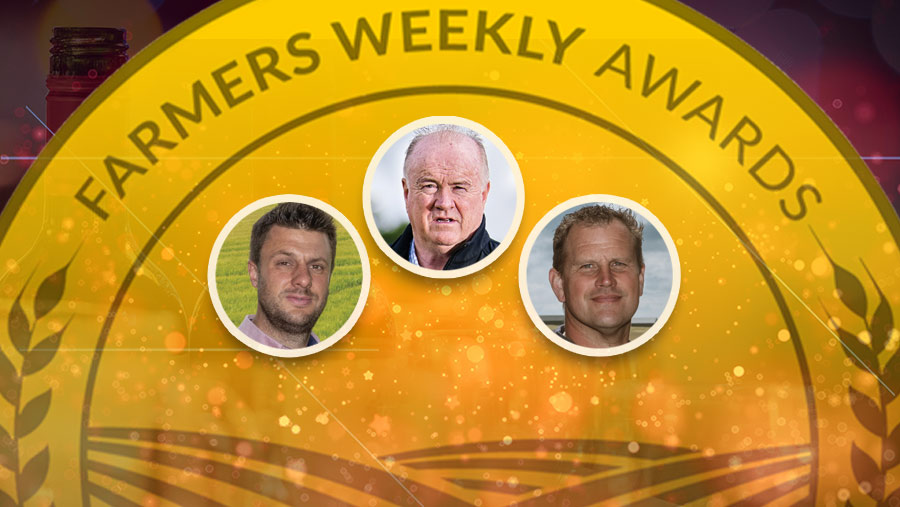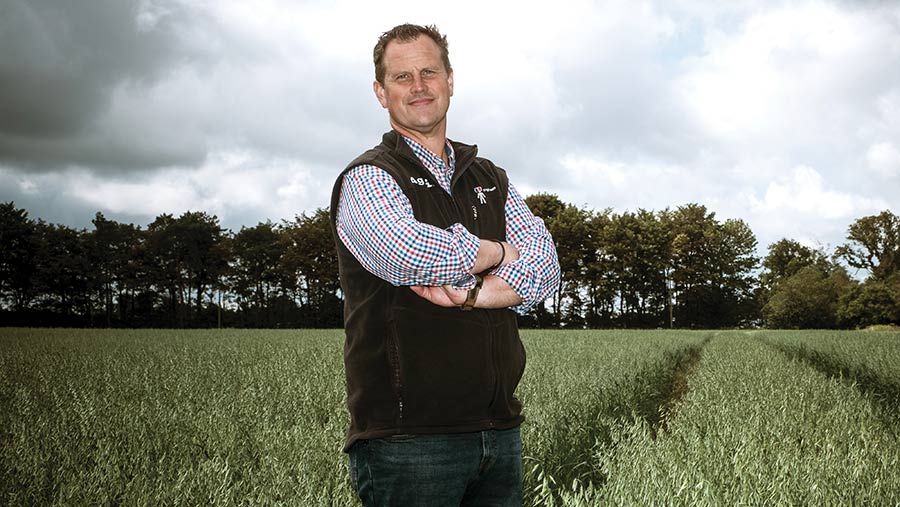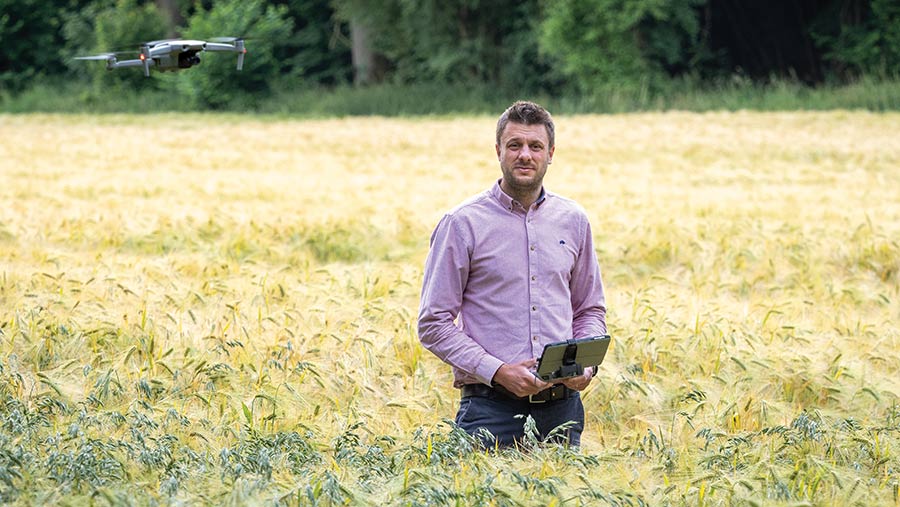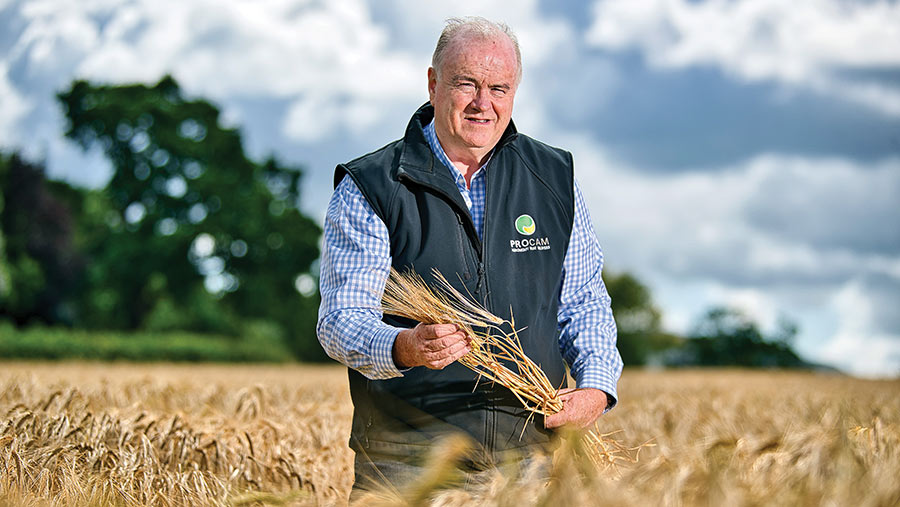Farmers Weekly Awards 2023: Arable Adviser of the Year finalists

The judges were impressed by the enthusiasm, professionalism and drive of the finalists in the Arable Adviser of the Year category.
All three arable advisers clearly consider many parameters when advising clients amid rising costs and diminishing direct support.
See also: Nominate your 2023 Farming Champion
The finalists:
Neil Harper
Agrii, Kent
Todd Jex
Agrii, Wiltshire
Merfyn Parry
ProCam County Crops, Denbighshire
The judges:
Jock Willmott
2022 Arable Adviser of the Year
Philip Case
Farmers Weekly chief reporter
Edward Vipond
Independent judge and farm manager
Neil Harper
Agrii

Neil Harper, finalist Arable Adviser of the Year 2023 © MAG/Colin Miller
Fact file
- Started working in farming aged 17 and has previously been an arable farm manager
- Basis- and Facts-qualified agronomist
- Provides advice across Kent and parts of Sussex
- Delivers local NRoSO training to clients and Agrii teams
Agrii agronomist Neil Harper demonstrates a “have a go approach” to new cropping, technology and products rolled out across his clients’ farms.
He relishes taking on new challenges to develop his career and deepen his understanding of agriculture.
Neil originally started doing seasonal work at John Boyd Farms in Lenham.
After leaving Hadlow College, he was then taken on full time and progressed through the business – from farmworker to arable farm manager.
Then, in 2015, Neil took the opportunity to join Agrii and move into agronomy advice – and he has not looked back.
Grower support
Neil manages the agronomy for a broad portfolio of customers, including farm owners, tenants, young farmers who are stepping into farm management, and contract farmers.
He started with about 2,000ha of business but has grown this to 6,000ha, retaining some 1,500ha of the original succession business, including giving the agronomy advice on the farm he started out on.
His clients’ farming operations range from full tillage systems to direct-drilling, and he advises on implementing all different aspects of regenerative farming.
Neil and farmer Alan Clifton-Holt, from AA Clifton, have been working together for six years.
The 1,600ha family farm is based in Romney Marsh, Kent, where high silt soils and a high water level can be beneficial, but bring challenges with soil structures and weed burdens.
In conjunction with Neil and Agrii, the farm has been battling a historic high blackgrass pressure, which in the past has seen yields reduced from a potential 12t/ha to 5t/ha.
Spring cropping and cover crops have been introduced into the farming system.
Wheat yields are now getting back up to the targeted 12t/ha.
Alan says Neil has brought “constructive change” to the farm business.
“We are doing reduced tillage. Varieties have changed too,” he says.
“Flea beetle pressure on oilseed rape can be high, so we are growing beans, spring oats and winter barley to lengthen our rotation.
“We have also moved into growing winter wheat Group 1s and 2s for profitability and resilience.
“We are using the data from Neil and the R&D that Agrii provides to help us do this.”
Alan is always looking at alternative cropping and mustard is the next crop on his research list.
Neil has introduced some large cover crop trials at his farm looking into different mixes and varieties within species, and the nutrient benefits they can gain from using these in different rotations.
Large plots of winter wheat (0.3-0.5ha) growing between 12-15 varieties, and including untreated plots, also help Alan decide how current and future varieties perform on-farm.
Alan and Neil use Agrii’s MAP benchmarking service and the Yagro benchmarking service.
The data is reviewed and used to make future decisions to help drive Alan’s business forward.
Additional services
In addition to the agronomy, Neil’s practical experience of farming helps him provide advice on all aspects of farming.
This ranges from budgeting, environmental and compliance, to digital farming, soils and machinery.
He also sources external support for specialist topics.
Each year, Neil (with the support of Agrii) hosts different events covering various farming topics, such as cover crops, machinery, spray and fertiliser applications, drilling days and local farm trials.
Outside of farming, Neil enjoys playing cricket and also coaches junior teams.
This gives him the opportunity to have family time with his wife and two children to try to strike a good work-life balance.
What the judges say…
Neil continues to experiment with various trial-based systems and methods to gain knowledge for himself to roll out to his client base. His enthusiasm and drive to achieve this stands out.
Neil Harper summary
The numbers
- 8 years working as agronomist
- 12 years working as arable farm manager before agronomy switch
- 6,000ha overall covered for arable advice
- 5 years hosting on-farm cover crop trials
- 200 people attended drill demo day in spring
The judges liked
- Engaging character, committed to his clients
- Background of practical farm management experience
- Committed to Agrii and taken a strategy position within the company
- Instigated his own farm trials to base advice on in the future
- Aware of Basic Payment Scheme regression and what it means to client base
Todd Jex
Agrii

Tod Jex, finalist Arable Adviser of the Year 2023 © Kathy Horniblow
Fact file
- Agronomist, soil consultant and hobby beekeeper
- Facts and Basis certificates in agronomy, crop protection soils, amenity horticulture and turf
- Training new field staff and agronomists into the business
- Graduated from Harper Adams University with degree in agriculture and crop management in 2011
Todd Jex is a “one-club man” who has been working for agronomy group Agrii for 12 years since he graduated from Harper Adams University with a degree in agriculture and crop management.
When he started working at Masstock (rebranded to Agrii) he had no clients, but now advises 25 arable farmers covering almost 10,000ha across Dorset, Wiltshire, Hampshire and the Isle of Wight.
Todd provides fully integrated agronomic advice, including bi-weekly field walking, advice on rotations, establishment systems, nutrient inputs, cultural management and machinery.
Great technical knowledge around soil health and monitoring forms the basis of his regenerative and no-till farming strategy.
Grower support
About 40% of Todd’s clients farm in a conventional manner and are generally min-till based.
The remaining 60% are no-till farming in regenerative-type farming systems.
Todd says his interest in no-till/regenerative farming systems was sparked by meetings with no-till pioneer Tony Reynolds in 2016.
He saw first-hand how his system had improved soil structure, lowered reliance on synthetic inputs and significantly reduced blackgrass levels, compared with neighbouring farms.
Todd has been instrumental in helping his clients move to more sustainable farming systems.
For example, Dorset grower and contractor George Fraser, who farms 1,400ha in Shaftesbury, has seen many benefits of switching 95% of his business to a regenerative system.
“We have seen an improvement in our gross margins, soil resilience and biodiversity while maintaining, and in most cases increasing, yields,” George says.
However, Todd is flexible in his regen approach and says he and his clients “cannot afford to be evangelical at the expense of profitability”.
For example, he is not against targeted use of the plough if he needs to press the reset button in a bad grassweed situation, such as brome and blackgrass.
He also gives consideration to crop residue levels and carbon-to-nitrogen ratios and how these will impact establishment.
Todd is acutely aware of cost pressures his clients face with the regression of the Basic Payment Scheme and increasing production costs.
So he is trying to make savings on their agrochemical bill, while still providing consistent crop yields and quality.
He is reducing their use of synthetic fertilisers and replacing this with organic manures in growing crops.
And his customers make full use of Agrii’s long-standing MAP benchmarking group.
Todd says most of his clients no longer use insecticides or only apply them for early drilled winter cereals.
They will be able to bank this opportunity under Defra’s Sustainable Farming Incentive.
Additional services
Todd backs up his crop walking service and reports with quarterly educational open days involving 200-plus farmers, a range of on-farm field-scale and tramline trials, and farm walks.
These have covered soil health, cover crops, no-till farming and technical advancements.
He has developed a set of chemical, biological and physical tests to monitor soil health, and recording system that allows future measurement of improvements.
In 2013, he launched a local farmer discussion group, 15 Tonne Club, with farmer members setting the agenda for meetings.
In recent years, Todd has used drone technology with Drone Ag’s Skippy Scout software alongside a handheld Yara N-tester to improve nitrogen-use efficiency.
This technology decision-making is backed up through the use of satellite imagery.
What the judges say…
Todd is embracing sustainable min-till/no-till strategies to help his clients minimise their costs, using extensive soil analysis and benchmarking to aid crop performance.
Todd Jex summary
The numbers
- 12 years working as an agronomist
- 25 farm business clients
- 10,000ha across Dorset, Wiltshire, Hampshire and Isle of Wight
- 60% of clients run no-till systems
- 4 years of bespoke soil health testing and reporting
The judges liked
- Great technical knowledge
- Dedication to more sustainable farming systems
- Scientific and analytical approach to agronomy
- Alternative nitrogen sources (digestate) used on farm
- Acutely aware of clients’ cost of production and gross margins
Merfyn Parry
ProCam County Crops

Merfyn Parry, finalist Arable Adviser of the Year 2023 © Richard Stanton
Fact file
- Worked on a small family farm in Llandyrnog, Denbighshire, early in his career
- Various farming jobs in early 20s before studying agronomy at RAC, Cirencester
- Worked for a couple of other agronomy firms before joining County Crops in 1986
- Elected as Facts-qualified adviser for the national Basis Membership Committee
Do your best for the farmer, and it will usually repay you in the end is the mantra of Merfyn Parry.
The North Wales-based ProCam agronomist says this has been his guiding principle for success in his agronomy career spanning more than 40 years.
Merfyn is a trusted supplier-agronomist offering products and advice to clients, a digestate broker to reduce fertiliser bills, and mentor to two staff members who have joined County Crops.
More than 60% of his business is conducted in Welsh – a language most of his clients feel comfortable doing business in.
Grower support
Merfyn works with a diverse range of businesses, covering everything from medium-
sized arable enterprises, a plethora of mixed farms and several large dairy farms, some of which extend from 400 to 1,000 cows.
He specialises in providing technical agronomic advice to a wide range of clients on wheat, barley and forage crops, such as grass leys, forage maize, fodder beet, grazing brassicas, wholecrop cereals and root crops.
Some shooting syndicates also value his help with growing the most suitable cover crops for pheasants.
Various climates across Merfyn’s region often present challenges in selecting the best crop varieties for different climates.
His biggest hurdle is coping with the loss of active ingredients, but drier conditions can also be demanding.
“The Vale of Clywd has an annual rainfall of approximately 25 inches [635mm], which is unusually dry for North Wales,” he notes.
Merfyn says herbicide-resistant weeds, such as ryegrass and blackgrass, are among the biggest threats to cropping.
Blackgrass is “thundering in” to the region and he is tackling this by stacking pre-emergence herbicides or putting fields back into grass or silage on livestock or dairy farms.
Providing fertiliser and crop nutrition advice is a key aspect of his work.
In February, he was elected to the Basis Membership Committee as the organisation’s Facts-qualified adviser.
Merfyn is nitrate vulnerable zone conscious and says increased focus on soil and tissue analysis of soils and slurries for nitrogen, phosphorus and potassium help inform his fertiliser plans for farmers who are looking to grow quality crops and grass to feed their cows.
He is also mindful of likely future restrictions regarding phosphate levels in soils.
His customers now use sulphur-based fertilisers to better effect with clear improvements in cereal grain and oilseed rape crop quality.
Merfyn recommends growing cover crops to enhance soil health and also benefit from stewardship payments offered by the Welsh government.
And he has found success in companion cropping maize with Italian ryegrass to reduce N run-off and soil erosion, and to provide winter grazing for sheep.
Additional services
Having been in the industry for the majority of his career, Merfyn is now sometimes working with the third generation of customers in his North Wales patch.
He is well-liked and widely respected not only by farmers, but so many other people in his region for his work as an independent councillor on Denbighshire County Council and as an organiser of charity events, including charity tractor runs.
Merfyn helped his company expand their coverage across North Wales with the recruitment of two new agronomists to the County Crops team: Rhys Owen, a seed expert who is now a key figure in ProCam’s Field Options team and Gareth Mitchell, a first-class forage agronomist.
He guides them both when needed, but trusts them to use their own knowledge and initiative.
What the judges say…
Merfyn is a well respected and trusted agronomist with long-term clients, some third generation. He adapts advice to predominantly forage-based clientele in the light of a low annual rainfall.
Merfyn Parry summary
The numbers
- 42 years working as an agronomist
- 60% of business conducted in the Welsh language
- £340,000 worth of business done in grass and forage seed mixes
- 635mm of annual rainfall in the dry lower Vale of Clywd
- £40,000 raised for various charities with colleagues through charity tractor runs
The judges liked
- Experienced, respected and trusted agronomist
- Expertise in grassland and arable agronomy
- Mentor to two recruits
- Committed to his clients and wider region
- Dedicated service to community
Arable Adviser of the Year 2023 is sponsored by FMC

Sponsor’s message
“FMC would like to wish all three nominees the very best of luck in the Farmers Weekly Arable Adviser of the Year 2023 category.”
Geoffrey Bastard, marketing and plant health leader for UK and Ireland, FMC
